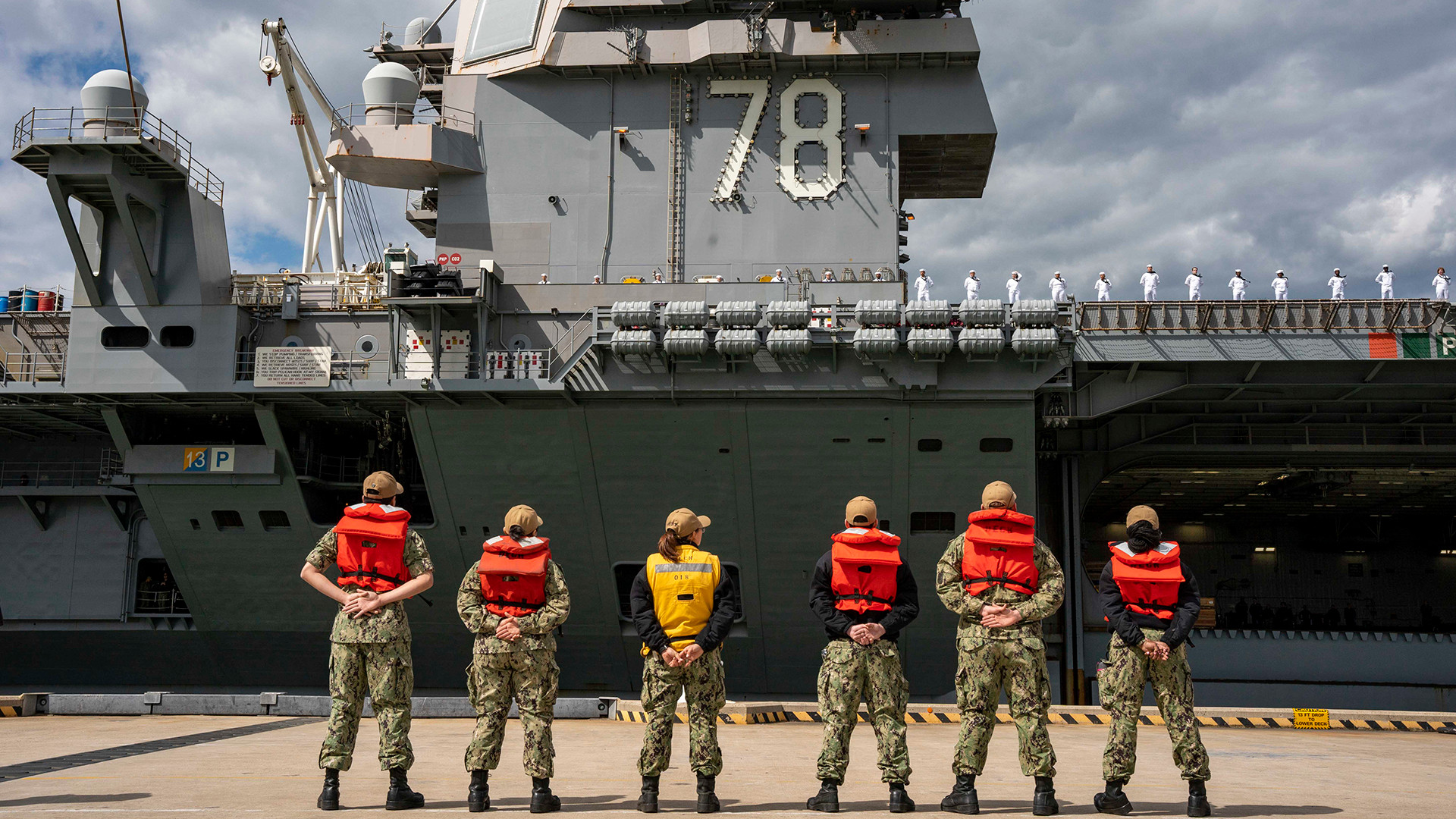The U.S. Navy’s newest supercarrier, the USS Gerald R. Ford, has departed its homeport in Virginia on its second-ever operational deployment. This is also the ship’s first full-length cruise after continuing to suffer from various technical issues and other setbacks following its official delivery four years ago.
The Ford is expected to conduct routine operations in waters around Europe, at least initially according to a report from Navy Times. The carrier did conduct a brief operational deployment into the Atlantic last year, which included exercising with European allies and partners, but the Navy itself admitted this was more of a stress test of the general capabilities of the long-troubled ship.
On this first true operational deployment, Ford is now set to take the place of the Nimitz class carrier USS George H.W. Bush. That carrier returned to Norfolk over the weekend after completing an eight-month cruise that took it to various locations around Europe and the Middle East. Bush‘s deployment had been extended in the wake of deadly attacks on U.S. forces in Syria in March, according to USNI News.
“She [the Ford] earned all of her certifications and met all the requirements to deploy. She’s designated to deploy the first week of May,” Navy Capt. Brian Metcalf, head of the Ford class carrier program office, said back in April, per USNI News. “We expect that to be at least a six-month deployment.”
The Navy had announced that the Gerald R. Ford Carrier Strike Group (GRFCSG) had successfully completed its Composite Training Unit Exercise (COMPTUEX) on April 3. COMPTUEXs are the capstone training events for carrier strike groups working up to their next deployment and have a particular focus on stress-testing their defensive capabilities.

At that time, the Navy said the GRFCSG consisted of the following elements:
“The staffs of Carrier Strike Group (CSG) 12, Carrier Air Wing (CVW) 8 and Destroyer Squadron (DESRON) 2. Participating units include Ford-class nuclear-powered aircraft carrier USS Gerald R. Ford (CVN 78), Ticonderoga-class guided-missile cruiser USS Normandy (CG 60), and Arleigh Burke-class guided-missile destroyers USS Ramage (DDG 61), USS McFaul (DDG 74) and USS Thomas Hudner (DDG 116). CVW-8 squadrons include the ‘Black Lions’ of Strike Fighter Squadron (VFA) 213, the ‘Tomcatters’ of VFA-31, the ‘Ragin’ Bulls‘ of VFA-37 and the ‘Golden Warriors’ of VFA-87; Electronic Attack Squadron (VAQ) 142; the ‘Bear Aces’ of Airborne Command and Control Squadron (VAW) 124; the ‘Rawhides’ of Fleet Logistics Squadron VRC-40; the ‘Spartans’ of Helicopter Maritime Strike Squadron (HSM) 70; and the ‘Tridents’ of Helicopter Sea Combat Squadron (HSC) 9.”
The listed squadrons here include ones equipped with F/A-18E/F Super Hornet fighter jets, EA-18G Growler electronic warfare aircraft, E-2 Hawkeye airborne early warning and control planes, and Seahawk helicopters. It’s not immediately clear if the mention of VRC-40 is in error since that unit was expected to be redesignated as Fleet Logistics Multi-Mission Squadron 40 (VRM-40) as part of its transition from the C-2 Greyhound Carrier Onboard Delivery (COD) aircraft to its replacement, the CMV-22B Osprey tilt-rotor.

Navy Times reported today that the destroyers Ramage, McFaul, and Thomas Hudner had or were also preparing to leave port today as part of this deployment, but made no mention of the cruiser Normandy. Carrier strike groups are typically accompanied during their deployments by one or more attack submarines, as well.
Exactly what Ford‘s deployment now may entail very much remains to be seen. The ship is heading toward Europe, a region that continues to be in the midst of its most serious security crisis in years with Russia’s war in Ukraine. There has been a notable spike in friction between the United States and various parties in the Middle East recently, too.

“Our presence at sea throughout the deployment will provide reassurance to our allies and partners that sea lanes will remain open, and our joint operations will demonstrate our commitment to interoperability and maritime stability,” Navy Rear Adm. Greg Huffman, the commander of Carrier Strike Group 12, said in a statement, according to USNI News.
At the same time, it is a significant milestone for the ship, which has struggled for years to reach a true operational state despite its formal delivery to the Navy in 2019. Over the years, Ford has faced major problems with its advanced electromagnetic aircraft catapults and electronically-tuned arresting gear, weapon elevators, radars, and other systems. This in turn has led to ballooning costs for Ford and the other planned ships in the class. The Navy long ago now officially capped Ford‘s price tag at $13.2 billion, which was already nearly $3 billion more than originally expected.
The issues with the catapults and arresting gear have been among the most significant. This is because the Navy has long touted the systems as giving Ford and subsequent ships in this class valuable increased sortie generation rates compared to their Nimitz class predecessors. In April, Capt. Metcalf said that this deployment was expected to give the service an opportunity to collect hard operational data to show whether or not those expectations are in fact the reality, according to USNI News.

Many eyes will certainly be on Ford and its crew now as it conducts this historic deployment, one that couldn’t come soon enough for the Navy.
Contact the author: joe@thedrive.com
